Eat this, Not that for an Active Lifestyle
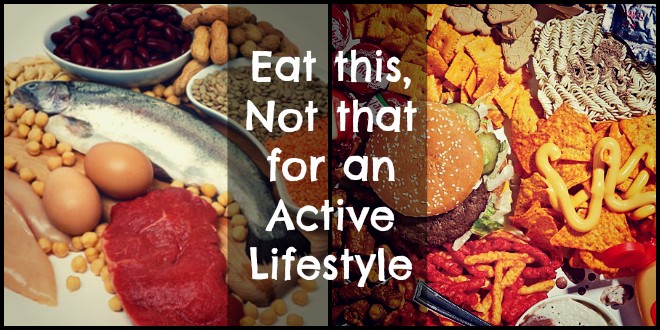
[dropcap]W[/dropcap]hether you’re heading out for a 5 kilometer run, a 1 hour boot camp , or a full day hike, eating the proper foods before , during and after your workout is essential. Though nutrition needs vary from activity to activity, one thing holds true: A fitness-friendly plan must contain carbohydrate for fuel, protein to build and repair muscles and fluids to cool the body. Eating a balanced amount of carbohydrate , fat and protein at the right times can optimize your energy levels.
So make note to "Eat this, Not that" for an Active Lifestyle
Fuel with carbohydrate
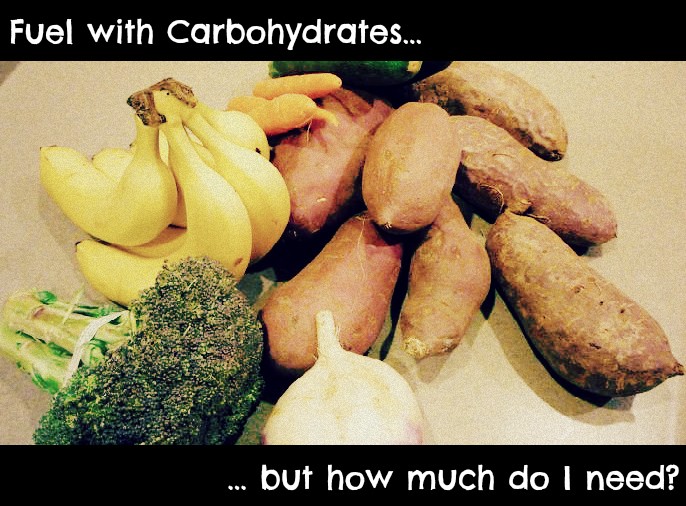 Foods high in carbohydrates deliver glucose into your bloodstream for fast energy. The rest is stored as glycogen in muscles - the primary fuel for all types of exercise. The more glycogen your muscles store, the longer you'll be able to exercise before feeling tired. Carbohydrates should account for 45-65% of your total energy intake.
Foods high in carbohydrates deliver glucose into your bloodstream for fast energy. The rest is stored as glycogen in muscles - the primary fuel for all types of exercise. The more glycogen your muscles store, the longer you'll be able to exercise before feeling tired. Carbohydrates should account for 45-65% of your total energy intake.Include carbohydrate-rich foods such as whole grain bread, brown rice, oats, pasta, fruit, beans, lentils and dairy products at all meals and snacks.
How much carbohydrate do I need?
The amount of carbohydrate you need depends on the frequency, duration and intensity of the activity. Since activity levels change from day-to-day, carbohydrate intake should fluctuate to show this. Gender and body weight are also factors in determining how much carbohydrate you need.
Build & Repair with protein
Protein needs may increase with exercise, but not dramatically. Protein is used to repair muscle tissues after a workout.
Good sources of protein include lean meat, poultry, fish, eggs, beans and lentils, tofu and milk.
How much protein do I need to eat daily?
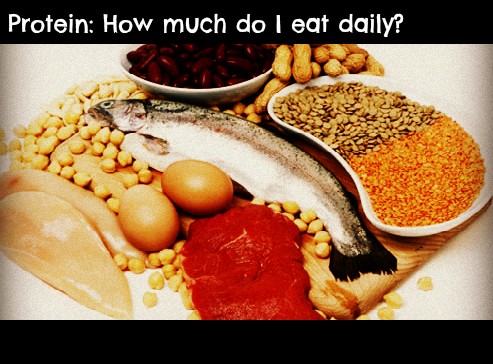 Protein needs are only slightly
greater in active people and athletes and can be met through food alone. Protein should make up 10-35% of your total energy intake each day. A moderately active person can easily figure out their daily protein needs in grams by multiplying 0.8 by their body weight in kilograms.
Protein needs are only slightly
greater in active people and athletes and can be met through food alone. Protein should make up 10-35% of your total energy intake each day. A moderately active person can easily figure out their daily protein needs in grams by multiplying 0.8 by their body weight in kilograms.For example, a 73 kg (160 lb) person needs about 58 g of protein each day (73 x 0.8 = 57.6 g). For strenuous activity and muscle-building, 1.0 to 1.2 should be used as the protein multiplication factors since protein needs are higher during these times. Current recommendations for protein consumption suggest that protein foods should be distributed evenly throughout the day to maximize muscle protein synthesis.
Don’t overdo it – there’s a limit to how quickly protein can be synthesized into muscle. Excess protein will either be burned for energy or stored as fat.
6 Examples of what you should be eating pre-workout
About 2 to 3 hours before an activity, eat a meal that is rich in carbohydrate, low in fat and fairly low in protein and fiber for quick digestion.
Examples include:
- Peanut butter and honey or jam on a bagel with a glass of skim milk
- Smoothie with fruit and low-fat yogurt and a muffin
- Oatmeal with dried fruit, nuts/nut butter, skim milk and banana
- Cheese and crackers with a piece of fruit
- Sandwich with hummus and vegetables
- Tuna melts with cheese, tomato and avocado
Post-Exercise Eating: What you should eat before and after your workout
After exercising, your body is ready to store energy again, repair muscles and re-hydrate. After any workout, eat a combination of protein and carbohydrate within 30 minutes, and again two hours later, to help your muscles recover, grow and re-energize.
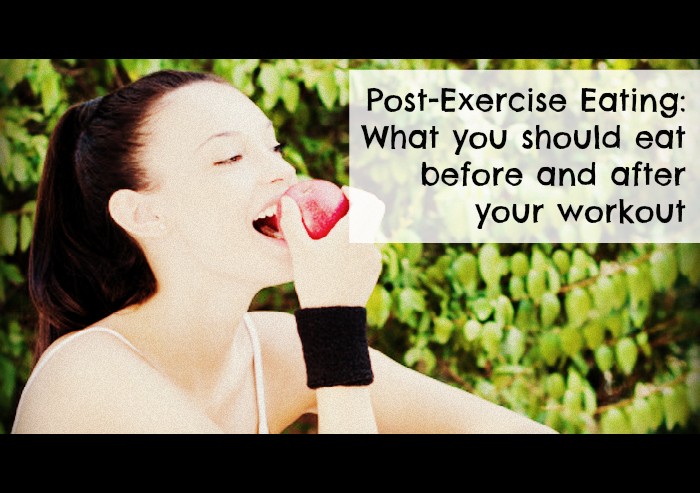
Within 30 minutes, eat a snack like:
- 1-2 cups of low-fat chocolate milk
- A smoothie with skim milk, yogurt and fruit
- Whole grain crackers and raw veggies and hummus.
- Greek yogurt parfait with fruit and granola.
- Glass of skim milk and fresh fruit.
- Trail mix or granola bar with nuts and dried fruit
Within one hour after that, choose a meal or snack like:
- Grilled salmon or chicken breast with brown rice and vegetables
- Whole wheat pasta and meat sauce with salad
- Tofu and vegetable stir fry with rice
- Whole grain wrap with black beans, grated cheese, and veggies
- Whole grain toast, eggs and fruit
- Smoothie with Greek yogurt, banana, berries, nuts/seeds and spinach
Drink up: 3 reasons why staying hydrated is important during exercise
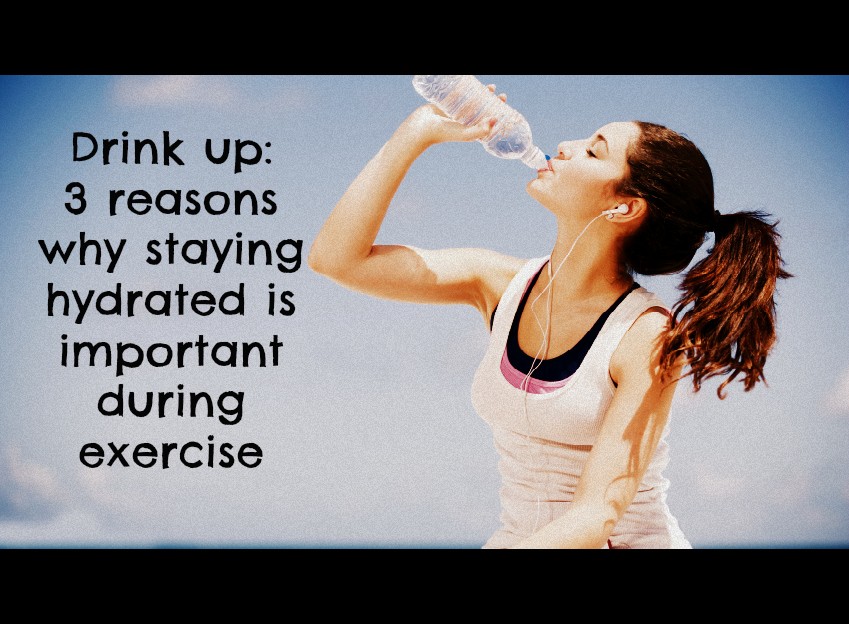
Staying hydrated is particularly important during exercise. Drinking adequate fluids is essential to performance, recovery and safety. Even slight dehydration can cause early fatigue during exercise. Adults need 9-12 cups of fluid each day for healthy living as well as extra fluid to replace losses through sweating.
- Drink plenty of water throughout the day leading up to when you exercise. 2-3 hours before exercising, drink at least 2 to 3 cups of water
- During your workout, sip water(or sports drink if applicable) often to replace losses through sweat.
- Hydration after exercise depends on fluid losses. To restore fluid balance your body needs to take in more water than what you lost through sweat. Let your thirst guide you throughout the rest of your day. Your urine will be pale yellow when you are properly hydrated.
Should I drink sports drinks?
Sports drinks are used to replace fluid and electrolytes lost through sweat. They are also a source of glucose for your muscles. Sports drinks are only recommended in certain situations:
- During very intense exercise that lasts longer than one hour
- If exercising in hot and humid conditions
- With very high sweat rates
[divider]
 Author bio: Carolyn Berry
Author bio: Carolyn Berry
Hi, my name is Carolyn, and my story is quite simple really……I love food! I’m a Registered Dietitian, so it may not be surprising that I’m always talking about and sometimes even dreaming about food. As a born and raised West Coaster, I love that the local and cultural food options available in the Vancouver area are never-ending... read on here.
BSc. in Food, Nutrition and Health: Dietetics Major (2013)
Registered Dietitian
Be sure to connect at ckberry86@gmail.com or carolyn.berry@fraserhealth.ca
Blog: www.wealthofhealth.ca
Twitter: @wealthof_health




































































































